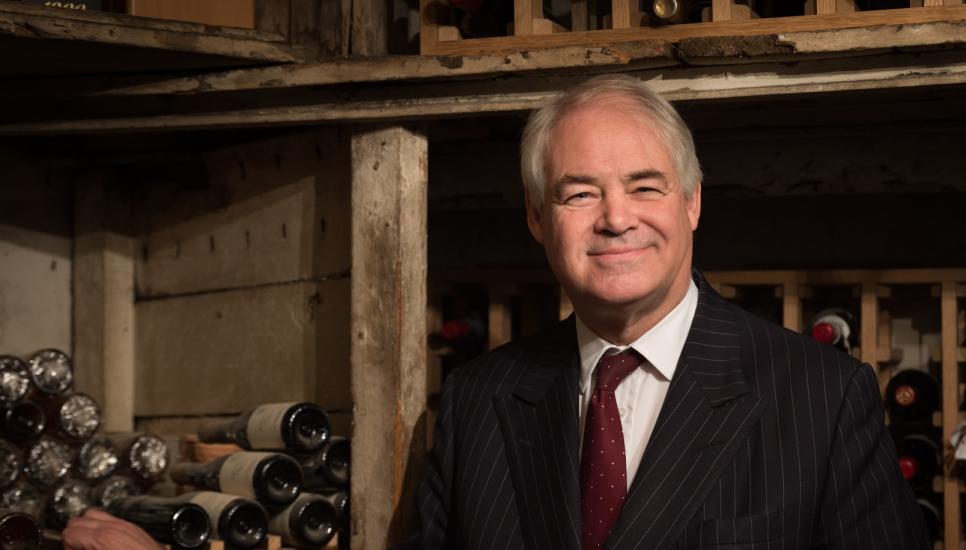Simon Berry: Good years for the rose

Berry Bros & Rudd has quenched thirsts since 1698. Now, 319 years later, a wave of corporate governance changes is setting it up for the next three centuries. Peter Crush reports
Every so often you catch glimpses of the fact Simon Berry really wanted to be an actor.
“This building [3 St James Street, London] dates to the 1530s,” he explains with vim, gesticulating flamboyantly at his surroundings.
“King Henry VIII secretly installed Anne Boleyn as…his mistress!” he orates with thespian aplomb.
“We moved in in 1698 – after the Lesser Fire of London” he quips. He adds, laughing: “You do realise my family were probably smugglers don't you?”
Measure for measure
It's a shame the UK's Royal Academy of Dramatic Art (RADA) lost out, but as Berry acknowledges, his career was already predestined to be somewhere else – working for the family business; being the next lineage of Berry Bros & Rudd. The business is officially the 11th oldest family-run company in the United Kingdom, and Berry is now the seventh-generation chairman. Acting was never really going to be a serious possibility–not when you're born into a business dynasty. He had big boots to fill.
If the Berry Brothers & Rudd name sounds familiar, it's because the wine and spirits merchant, which first rose to prominence as a supplier to royal households (and even supplied wine to the Titanic), is now a global international player. It sells increasing quantities of wine to the growing Asian and Chinese markets (it become the first major retailer to give wines from China a permanent place on its shelves).
Its spirits division also had a busy 2016–it launched several new brands including a new Bourbon and whisky Craoi na Mona, to complement its strong cognac, vodka and rum brands, including Pink Pigeon (rum) and The Genrothes (single malt whisky).

The business is actually an amalgamation of two lines of families–the Berry and Rudd families. The first Berry was born in 1787 and was the first to take over the business, while Hugh Rudd, a wine merchant from Norwich, joined the business in 1920. Today Elizabeth Rudd is deputy chairman, while her brother Edward is also a director.
By virtue of its sheer longevity, Berry Bros & Rudd is a family business that has long had to face the thorny issue of succession. The fact it is still here, suggests it has managed to do it well–even if the latest chairman almost got away.
“I was the only son,” he explains. “I tried to escape! But it was always accepted I would be part of the business. I had my mild form of teenage rebellion and went to drama school, but the business is a bit like inheriting a stately home–it is important you take it on. It was about me embracing my fate.”
Partners in wine
While it was a sense of 'fate' that won over in Simon Berry's case, in the last year and a half, the difficult topic of succession has been much more visibly on the agenda. This is not because there are no more successors left (the eighth Berry is already in the business), but because this particular Berry wants to make sure the 'right' person eventually takes over. As part of this ambition, he wants the next leadership to be respected for reaching the top through toll rather than nepotistic privilege, which will always be a hard act to balance.
“Most family businesses fail because their children take over by virtue of their blood, than their skills,” he says unapologetically.
“By any other measure most of these people would be unemployable. This is not what we want to happen at Berry Bros.”
The solution he's come up with has been to employ a non-family executive [in 2015 Berry hired Tesco's director of wine, Dan Jago, as chief executive] then ensure the right family members do what he calls “the right type of change.”

In explaining this, Berry says “he needs businesspeople,” but the rule is that they “should not be the agents of change.” At first glance, this sounds like the family is very much the boss still, and to an extent it is, but Berry's reasoning is this: “It is the family who should come up with ideas. I want my managers to question and even put the brakes on these ideas, if they have to, but I do not think things should work the other way around.
“Family members are unconsciously brought up knowing exactly what the business represents and what it needs to keep, and what it needs to change.
“Accountants and managing directors may come in and say X, Y or Z, but they don't understand the 'soul' of the business.”
He adds: “Dan 'gets' this totally. He brings in commerciality, but knows it is not a one-way street.”
Fortunately in Simon Berry's case 'ideas' haven't been in short supply. In 1994, he launched bbr.com–the world's first online wine website; in 2007 he launched Berry Brothers Broking Exchange (BBX)–an online trading platform that allows investors to buy and sell privately-owned wine in its UK-bonded warehouse. He was also instrumental in securing the deal to open a store in Heathrow's Terminals 3 and 4 – the first time a wine merchant had opened such outlets.
Berry attributes some of this commercial nous to studying for a Harvard Business School 'mini MBA' in 1999, which he claims gave him a proper business-grounding to supplement the passion he eventually developed for wine since he entered the business in his early 20s.
However, succession is still where his mind is, and what he is also very conscious of is the fact there is no guarantee the ninth generation Berry will be as business-minded as him. It is for this reason he has put in new rules, some of which are a byproduct of the recently established family board.

Heard it through the grapevine
The new rules sound draconian, but are needed, Berry says.
“Any family member who wants to be part of the business effectively has to apply now. They have to be accepted by someone on the board who is not a member of the family. They have to have a degree, and not only that, they have to have worked in a business outside the wine trade for a minimum of three years.”
According to Berry, such conditions effectively “raise the bar” and ensure the most talented members of the family actually want to join.
“If you lay the rules down, it raises the hurdles people need to jump to get in but that is no bad thing. We want family to actually want to join. When I was young, I simply felt I was born into it. I honestly think that had my father made it harder for me, I would have wanted to join more. It is this desire I want to set in stone going forward.”
These rules are the product of the family board–described in a press release at the time as part of a move to 'more fully integrate' members of the owning families. The board was launched this year, but had its roots in a change of personnel in 2015.
“Back in 2015 I felt we were not going in the right direction,” recalls Berry.
 “There was an impasse between the former managing director, Hugh Sturges, and the family” – perhaps referring to occasions where arguably it was the managing director trying to call the shots (and co-ordinate change), not the family. It was Sturges, for example, who had been instrumental in Berry Brothers' decision to sell its whisky brand, Cutty Sark, in 2010, and also focus on distributing premium spirits and wine into Asia. Both these moves (especially the Asian investment plan) saw the business report its first ever pre-tax loss in 2012-13 of £7.3 million ($9.5 million), after £1.4 million in profit the previous year, followed by another loss in 2014. Sturges left the following spring, and Berry temporarily took over until Jago came on board [in Berry's words he “rescued” him].
“There was an impasse between the former managing director, Hugh Sturges, and the family” – perhaps referring to occasions where arguably it was the managing director trying to call the shots (and co-ordinate change), not the family. It was Sturges, for example, who had been instrumental in Berry Brothers' decision to sell its whisky brand, Cutty Sark, in 2010, and also focus on distributing premium spirits and wine into Asia. Both these moves (especially the Asian investment plan) saw the business report its first ever pre-tax loss in 2012-13 of £7.3 million ($9.5 million), after £1.4 million in profit the previous year, followed by another loss in 2014. Sturges left the following spring, and Berry temporarily took over until Jago came on board [in Berry's words he “rescued” him].
“We needed to find a new managing director; it was the family saying it wanted more involvement–not to control everything, but to have the management more aligned to what the family wanted to do,” he explains. In 2016, the company reported operating profit of £1.68 million on revenues of £126 million.
The management shake-up in 2015 also saw Edward Rudd become financial planning director and Geordie Willis, Berry's nephew, become creative director, both reporting to Berry.
“The family was clear we wanted to make sure the wine part of the business was still relevant,” he says. And it was when the former chairman John Randall Rudd retired in July 2016 (after 72 years in the business) that Berry said the opportunity further presented itself to reshape the board in more his vision of how it needed to be to ensure its future.
“We have effectively slimmed it down from 12 to eight board of directors,” he says.
“I just felt it had gotten too large. But, a key part of the change was to allow the next generation to come through. As it stood the old board was not doing that. What the family board now has is two spots for family members who do not currently work in the business, but might do in the future, so that they can rotate-in and start thinking of themselves as custodians of the business.”
While the boardroom sweep might outwardly have all the hallmarks of the family trying to wrestle back control, it was, he argues, a considered move to ensure the business stays a family one and the future of the business would be protected. “In the boardroom I felt I had to end the cycle of family members not being listened to for 20 years, under the proviso 'your time will come'–but then when they do get to a certain age, then being overruled.”
And, rather than this hampering change, he argues the move will actually help foster it.
“Younger family members have better ideas–I have to make sure I get them in the business now,” he says.
 But there is another reason for all this change too: skills shortages. When Berry was 20, he said he had to be cajoled into the business, and there was never any doubt he would not be part of it. Today, Berry argues, many of his family members are genuinely more interested in making their own names, in commerce outside Berry Brothers, and not being handed a lifestyle on a plate.
But there is another reason for all this change too: skills shortages. When Berry was 20, he said he had to be cajoled into the business, and there was never any doubt he would not be part of it. Today, Berry argues, many of his family members are genuinely more interested in making their own names, in commerce outside Berry Brothers, and not being handed a lifestyle on a plate.
“I can no longer make my leadership and succession planning all about paternalism,” he says.
“I cannot strut around in here, wearing a crown, expecting the next generation to take over. I have to work harder at this now!”
Rieslings to be cheerful
In a business with more than 300 years of history [a ledger on display shows orders from the High Royal Highness the Duke of Cambridge, and the Duke of Orleans–both from the 1700s], it is an ironic twist that it is the latest generation that is forcing the most change. This is forcing the leader of a hereditary business to not simply assume the next-born will necessarily take over.
“But that is fine,” says Berry, typically ebullient. “What family businesses do both best, and worst is change. There are some that hate the idea of change, and they will simply wait till the leader dies; and then there are others that embrace it. I actually think we have always changed; I feel we are brilliant at it, because we have been brought up in it. It is this heritage that an 'outsider' may well empathise with, but will never truly understand.”
And so, for someone's who publically said he wants Berry Brothers to still be around in another 300 years, the outlook is promising. The eighth generation is already onboard, and their children–the future ninth–will surely come to benefit from the rules of the new family board.
“One thing that I think will never change, is that family-run business heads will always have to work twice as hard,” he muses.
“They will always have prove to other, 'proper' CEOs that they are there because they deserve to be, and not because they were born into the family. This is a burden we shoulder, but that is the way I feel it will always be.”
But as he trails off, Berry, it appears, is content at the way he has turned initial reluctance to unbridled passion for keeping an ancient family business going. Oh, and there's one last important footnote too–going into the family business did not actually forfeit a role at RADA after all. He has made it there (of sorts). He is now–rather aptly perhaps–the stage school's development board chairman. Who says you do not always get what you want with family businesses?







